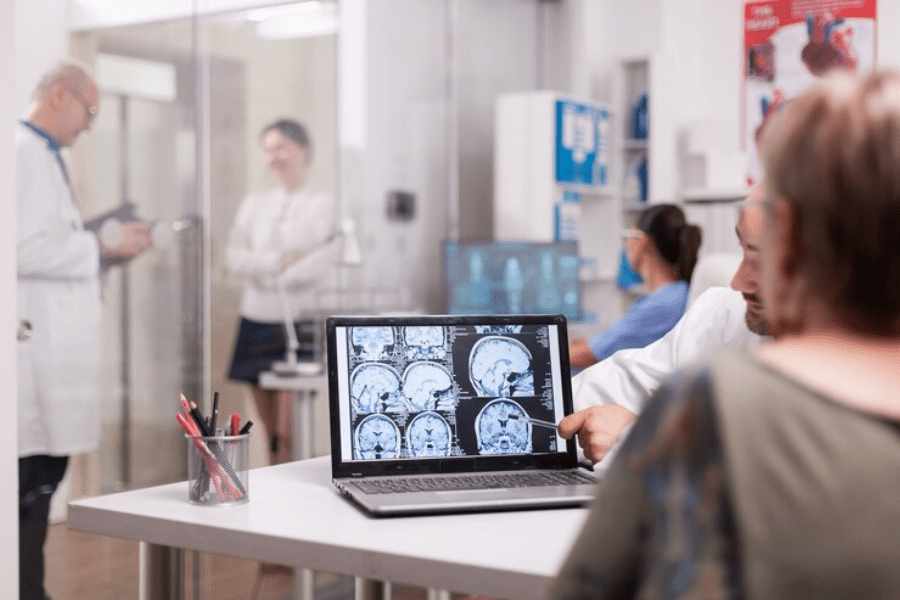Alzheimer’s disease
Overview
Alzheimer’s disease is a very common type of dementia in older adults, that slowly destroys memory and thinking skills, and finally, the ability to carry out even the simplest tasks.
Alzheimer's disease is thought to be caused by the abnormal build-up of proteins in and around brain cells.
The early signs include forgetting recent events or conversations. Over time, it progresses to serious memory problems and loss of the ability to perform everyday tasks. There could be an inability to communicate, lack of awareness of the surroundings, physical decline, difficulty swallowing, or even more. Alzheimer’s, symptoms first appear later in life and worsen over time.


Alzheimer's Symptoms
• Memory issues – forgetting recent conversations or events - misplacing items. It is one of the first signs of cognitive impairment..
• Forgetting the names of places and objects, having trouble thinking of the right words, confused.
• Poor judgment or finding it difficult to make decisions - Asking questions repetitively
• Quite hesitant to try new things.
• Movement difficulties – Less flexible
• Word finding, vision issues, and impaired reasoning or judgment may signal the very early stages of the disease. Studies are using biomarkers to detect changes in the brain, in cognitively normal people who may be at greater risk for disease.
Alzheimer's Causes & Risks
• Increasing age is the greatest known risk factor for Alzheimer's disease, and isn't a part of typical aging.
• Alzheimer's is characterised by changes in the brain leading to deposits of certain proteins.
• Causes include a combination of age-related factors, along with genetic, environmental, and lifestyle.
• Health care providers use several methods to help determine whether a person who is having memory problems has Alzheimer’s.
• The importance of any one of these factors in increasing or decreasing the risk of developing Alzheimer’s may differ for every person involved.
• Alzheimer's causes the brain to shrink and brain cells to eventually die. Alzheimer's disease is the most common cause of dementia – memory loss.


Test & Diagnosis
• Ask questions to the affected person and a family member or friend about the overall health. The provider may also ask about the use of prescription and over-the-counter medicines, diet, medical history, ability to carry out daily activities, and changes in behavior.
• Perform memory tests, problem-solving, attention, and counting tests.
• Order standard medical tests to identify possible causes of the disease.
• Perform tests to determine if depression or another mental health condition is causing or contributing to a person’s symptoms.
• Order blood tests to check the levels of proteins associated with Alzheimer’s and related dementias.
• Perform brain scans, to support an Alzheimer’s diagnosis.
Alzheimer's Treatment
• It is unlikely that any one drug will successfully treat Alzheimer's in all people living with it. In clinical trials, scientists are developing and testing several possible treatment interventions.
• Medications to treat the progression of the disease are emerging, by targeting its cause. Some medications can temporarily stabilise memory and thinking skills in some people. It may help manage certain behavioral issues.
• People with Alzheimer’s also may experience depression, anxiety, agitation, and other behavioral and psychological symptoms. Scientists continue to research why these symptoms occur and are exploring new medications and non-drug strategies to manage them.
• Treating the symptoms may make people with Alzheimer’s feel more comfortable and also help their caregivers. Antidepressants and anti-anxiety drugs can be very helpful for most people with Alzheimer’s.
• Experts agree that the medications must be used only after other techniques to promote physical and emotional comfort.


Living With Alzheimer
People with Alzheimer's disease and their caregivers face challenges.
Persons with Alzheimer’s may experience difficulty remembering recent events, solving problems, or even making any decisions. Implementing memory aids, using calendars, and creating a structured routine can help manage daily tasks better.
Caregivers have an important role in providing physical, emotional, and practical support. They assist with daily activities, medication management, and ensuring safety while dealing with the emotional strain and challenges associated with caregiving. Implementing safety measures at home, such as installing locks, etc. helps prevent accidents.
Managing regular check-ups, medicines, and treatments aimed at slowing the disease progression are part of the ongoing care plan. Therefore, maintaining a good quality of life involves focusing on meaningful activities, social connections, and maintaining relationships with family.
Complications
• The main symptom of Alzheimer's disease is memory loss, which worsens over time.
• The disease can cause changes in behavior and personality, including anxiety, depression, and irritability.
• Individuals with Alzheimer's may become disoriented leading to confusion and an inability to recognize familiar surroundings.
• Alzheimer's may cause disruptions in sleep patterns, leading to insomnia.
• As days go by, individuals may face challenges with self-care tasks, requiring increased assistance.
• Alzheimer's can affect language skills, making it difficult for individuals to express themselves.
• Alzheimer's creates stress on caregivers, leading to physical and emotional burden.


The Content is not intended to be a substitute for professional medical advice, diagnosis, or treatment. Always seek the advice of your physician or other qualified health provider with any questions you may have regarding a medical condition.
Know more about
Our Healthcare Planner
Personal Health Planner at BNC is a support staff who listens to your concerns and connects you with a Neuro Care provider. They prioritize your needs and create a trusting relationship between you and the provider.
Three fundamental values we can assure you:
1. Personalized Healthcare.
2. Most advanced robotic therapies
3. Transparent pricing





